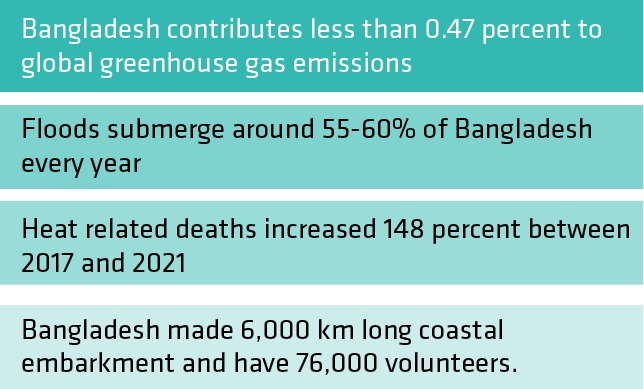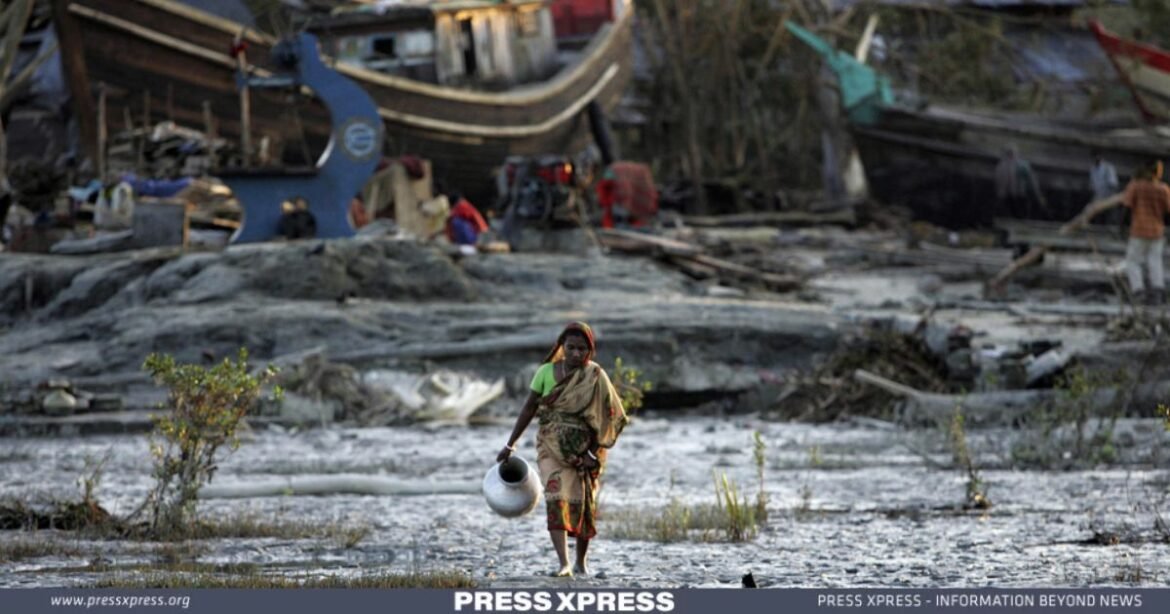Key Highlights:
- Climate change may displace 216 million people by 2050
- Nearly 700,000 Bangladeshis are displaced internally every year in past decade
- Five suggestions given to address the issue of impact of climate change
Prime Minister Sheikh Hasina seek global support for nations most affected by climate-induced displacements, emphasizing the need to avert such circumstances from escalating into a humanitarian catastrophe.
You can also read: PM’s Article Featured in Newsweek to Prevent Climate Induced Catastrophe
“Most climate displacements take place within national borders and beyond borders in some worse situations,” she told the 114th Session of the International Organisation for Migration (IOM) Council virtually on Tuesday (November 28).
Climate change could displace 216 million people globally by 2050. Among these, 40 million alone would be in South Asia. In Bangladesh, 20 per cent of its population lives along the coastal belt, PM estimates.
“Sea-level rise, salinity intrusion, frequent floods, and severe cyclones make them vulnerable to forced displacement. Such displacements are happening at a faster pace than we think,” she warned.
Prime Minister stressed the need of ensuring social protection, basic services and livelihood measures for the climate refugees.
“The adverse impacts on their host communities also need to be addressed in an inclusive manner,” she said.
Over the last decade, nearly 700,000 Bangladeshis were displaced on average each year by natural disasters, according to the Internal Displacement Monitoring Centre.
Bangladesh host more than 1.2 million forcibly displaced Rohingyas from Myanmar in its coastal district of Cox’s Bazar, which puts extra burden on its battles against climate adversities.
“Some of these people fall victim to trafficking networks with security risks for the entire region. Such mixed migration flows make the issue of climate mobility even more problematic,” she added.
The prime minister reaffirmed Bangladesh’s position that the impact of climate change on human mobility should be placed high on the international agenda
Sheikh Hasina’s Suggestions to Address Climate Change Impact
PM Hasina put five suggestions to address the issue of impact of climate change on human mobility.
These are: First, we need to address the climate impact of human mobility in a rights-based manner in line with the Global Compact on Safe, Orderly, and Regular Migration;
Second, we should consider the situation of climate migrants through the lens of climate justice to find context-specific solutions for the loss and damage they suffer.
Third, we must get prepared at local, national, and international levels for looking at migration as a climate adaptation strategy where it proves to be the best possible solution;
Fourth, we need to review the existing international protection standards to repurpose them for climate migrants, especially women, children, and other vulnerable groups; and
Fifth, we should invest in well-researched data and evidence on the impact of climate change on human mobility to build an objective case for it beyond narrow political considerations.
Climate Change Puts Millions of Bangladeshis at Health Risk
Climate change is significantly impacting the well-being of the Bangladeshi population, obstructing efforts to reduce poverty and impeding the nation’s path towards achieving a net-zero future.
According to findings from the Grantham Research Institute on Climate Change and the Environment and the Centre for Climate Change Economics, Bangladesh has experienced a staggering 46 percent rise in extreme weather events.
The study further reveals a striking 148 percent increase in heat-related deaths among individuals aged 65 and above, leading to 1,430 fatalities between 2017 and 2021.

The report emphasizes that climate change severely impacts public health in Bangladesh. Catastrophic events like droughts, floods, and cyclones not only damage land and health facilities but also endanger people’s well-being.
Extreme heat poses challenges for vulnerable groups like the young, elderly, and those with health conditions. Bangladesh’s air pollution elevates mortality rates due to respiratory infections, lung cancer, and heart diseases. Climate-induced changes threaten food security, nutrition, and livelihoods in the country.
According to another report by the Grantham Research Institute on Climate Change and the Environment and Centre for Climate Change Economics, floods submerge around 55-60% of Bangladesh every year.
Of Climate Change and Disease Burden
Variations in temperature, precipitation, and ecological systems can shift the spread of disease-carrying vectors, affect the life cycles of disease-causing microorganisms, and influence human behavior and susceptibility to illnesses.
Malaria, dengue fever, and other illnesses are affected by climate change. Warmer temperatures expand the range of disease-carrying mosquitoes and ticks, potentially spreading these diseases to new regions. Additionally, climate change may increase water-borne diseases like cholera and air-borne diseases like influenza.
In the context of Bangladesh, without prompt and efficient national-level preparedness measures, the country is at high risk of experiencing increasingly severe dengue outbreaks in the near future. Immediate interventions are crucial to mitigate these potential health crises.
Bangladesh’s key role in combatting climate change
Bangladesh is actively addressing climate change despite its contribution of less than 0.47 percent to global greenhouse gas emissions. The country has initiated several efforts to attract investments in climate change mitigation. It focuses on a fiscal framework to channel more resources for adaptation endeavors and has introduced new environmental guidelines to support green financing, promote green banking principles, and establish specific funds.
Bangladesh actively seeks grant financing from the international community, emphasizing engagement with the Green Climate Fund to underscore its commitment.
Furthermore, marking a noteworthy accomplishment, Prime Minister secured the prestigious ‘Champion of the Earth’ award in 2015, the highest environmental honor bestowed by the United Nations.
Bangladesh’s proactive climate measures, like the Bangladesh Climate Change Strategy and Action Plan (BCCSAP) and the Climate Change Trust Fund, set an exemplary model. Government-led policies and investments fortify resilience against disasters. Initiatives, including coastal embankments securing 6,000 km of coastline and a cyclone early warning system involving 76,000 volunteers, showcase their dedication to climate resilience.
Bangladesh Delta Plan 2100 aims for sustained development of the country’s deltas and rivers by managing water and land resources. The Forest Department’s new approach measures carbon emissions using the IPCC GHG Inventory software, offering cost-effective emission reduction solutions with added benefits like energy savings. The Sundarbans also holds immense ecological importance.
Sheikh Hasina took several initiatives to protect the region from deforestation, conserving biodiversity, and tackling the negative effects of climate change.
Bangladesh’s Advocacy for Climate Action on the World Stage
Throughout the years, Prime Minister has taken the initiative to spotlight the issue of climate change on the global stage, advocating for collective efforts to combat its impact.
Addressing the G20 summit on September 9, 2023, Prime Minister Sheikh Hasina emphasized,
“Despite our minimal contribution to climate change, Bangladesh has borne the greatest brunt. Urgent action is needed to activate the Loss and Damage Fund, establishing financial mechanisms to tackle climate-induced migration.”
Attending the 78th session of the United Nations General Assembly on September 22, 2023, in New York, Prime Minister Sheikh Hasina dedicated her speech to addressing the challenges posed by climate change.
“Bangladesh is committed to protecting and preserving the environment and biodiversity and pursuing a climate-resilient sustainable development path. In line with the long-term temperature goal set out in Article 2 of the Paris Agreement, Bangladesh is developing its national low-carbon emission strategy and mitigation actions through green initiatives including renewable energy.”
COP26 saw Bangladesh and the UK uniting their efforts, drawing on the COP presidency and Bangladesh’s leadership in the Climate Vulnerable Forum. The partnership was officially cemented in March of this year, with the UK’s Minister of State for Indo-Pacific, Anne-Marie Trevelyan, and Bangladesh’s State Minister for Foreign Affairs, Md Shahriar Alam, signing the Bangladesh-UK Climate Accord. This accord symbolizes their mutual commitment to combatting climate change and fostering collaborative solutions. Beyond COP28, they have plans to continue and expand the UK-Bangladesh partnership.


